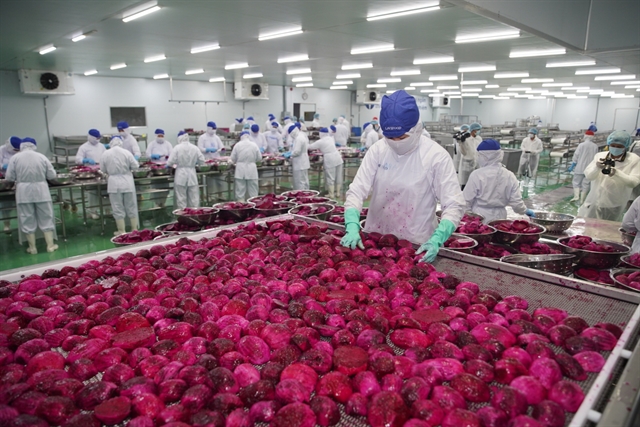The fruit and vegetable farming segment needs to restructure production, enhance linkages among stakeholders in the value chain and invest in modern processing plants.

The fruit and vegetable farming segment needs to restructure production, enhance linkages among stakeholders in the value chain and invest in modern processing plants, Minister of Agriculture and Rural Development Nguyen Xuan Cuong has said.
Speaking at a meeting with farmers and businesses in Long An Province on Tuesday to discuss measures to resolve difficulties caused by the novel coronavirus epidemic, Cuong said the country has 60,000ha under dragon fruit, which yield three million tonnes a year and fetching nearly US$2 billion from exports.
In the Long An Province’s Chau Thanh District alone, all agricultural lands are now under the fruit.
But he also pointed to limitations like mainly exporting fresh fruits and relying too much on the Chinese market.
So the dragon fruit segment in particular and the agricultural sector in general needs to restructure, especially in the context of the epidemic, he said.
“This is a good opportunity for major dragon fruit cultivation areas such as Binh Thuan, Long An and Tien Giang to review the entire production process to restructure it and persuade businesses to participate in organising production and processing chains of the fruits.
“Besides continuing exports to traditional markets, we also need to seek more new export markets.
“Businesses must pay greater attention to the domestic market of 100 million population.”
They need to develop close links with farmers so that the latter can grow products that meet the demand in global markets and enterprises must upgrade their processing chain to improve quality, he said.
Farmers have begun harvesting dragon fruit, but exports to China, the largest market for it, has plummeted due to the impact of the epidemic.
“We will firstly seek measures to ensure farmers’ products are consumed and then proceed to comprehensive restructuring of agriculture in order to add more value to our agricultural products and ensure a better life for farmers,” Cuong added.
Dang Ngoc Can, general director of Lavifood JSC, said: “We specialise in processing fruits and vegetables for exports to fastidious markets such as South Korea, Japan, the US and the EU. To help reduce farmers’ difficulties due to the impact of the epidemic, we have increased the purchase of dragon fruit and process it into various products such as juice, dried fruit, soft-dried fruits, and frozen products.
“A new product line, the 'We Love' fresh and natural dragon fruit juice, is about to be launched in the market.
“To do this, we had to completely change our business plan for 2020.”
Lavifood on Tuesday signed an agreement with the Saigon Commercial Joint Stock Bank, Saigon Co.op [owner of Co.opmart supermarket] and Green Start-up Fund to support farmers.
At a working session with Cuong, Long An Province authorities called for subsidising electricity costs for cold storages until the end of March to businesses that buy, preserve and export agricultural produce and provide them loans at preferential interest rates to facilitate their purchase of dragon fruits from farmers.
The province also wanted the ministry to establish a distribution centre for agricultural produce in China and connect major dragon fruit-growing localities to avoid sudden increases in output. — VNS
|
Over 6,500 tonnes of farm produce exported via Lao Cai border gate Over 6,500 tonnes of Viet Nam’s farm produce were exported via Lao Cai border gate in the northern province of Lao Cai as of February 12 after suspension due to the novel coronavirus (COVID-19) outbreak. From February 8-12, Lao Cai border gate imported the loads of farm produce on 613 trucks and exported those on 363 others, mostly dragon fruit, water melon, banana and jackfruit, said deputy head of the border gate’s customs branch Tran Anh Tu. The total exports-imports via the border gate neared 13,000 tonnes worth US$5.3 million during the period. Viet Nam’s farm produce export to China totalled over 6,500 tonnes valued at around $4 million. The figure is expected to increase in the coming days. On February 11, a border market in China’s Hekou township also opened again after days of temporary shutdown due to the epidemics, thus facilitating trade activities. — VNS |





